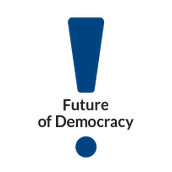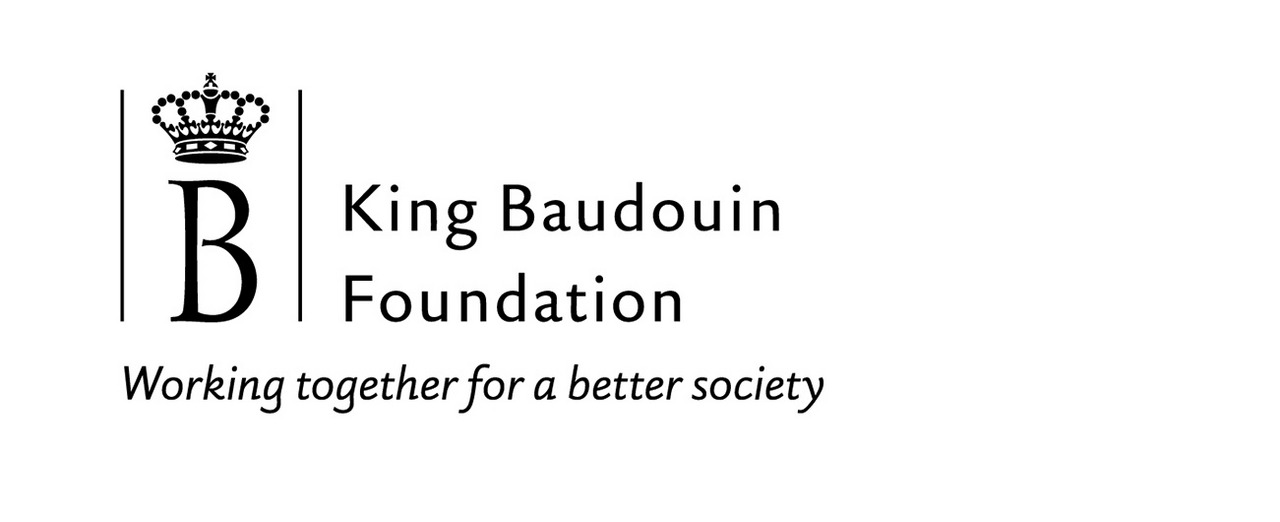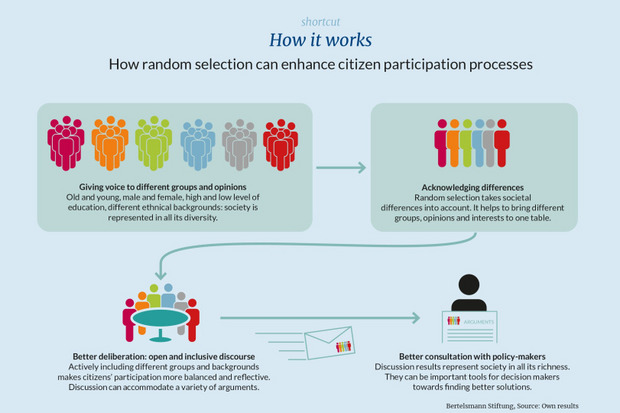Good participation means that all parts of society are heard and that solutions are based on a variety of diverse opinions and interests. Random selection is increasingly used in citizen participation to achieve a maximum of diversity and inclusion. Yet it takes more than good will to harness the potential of random selection in politics.

An ancient tool for more diversity
Random selection, from ancient Greece to today
Today, democracy is primarily associated with elections. Yet, as the ancient Greeks already knew, participation in a democracy can and should be more than just voting. In ancient Greece, random selection was widely used to allocate political and public positions. Today, the random selection of citizens is often used in participation processes. It can be a powerful tool, as it allows for the voluntary involvement of a great diversity of people in politics. Everyone has a fair chance to have his or her voice heard. This way, politicians can receive unbiased input on a given topic.
Random selection can enhance citizen participation on all levels
Nowadays, random selection is increasingly becoming an integral part of citizen participation processes on all political levels. The city of Gdansk in Poland tackles key communal problems with a citizens’ assembly. The German-speaking community in Belgium set up a citizen’s assembly to support the work of its parliament. Ireland successfully tackled the problem of regulating abortion through a citizens’ assembly. These are only some examples of successful random selection in citizen participation.

Random selection as a tool for participation is great — but cannot do everything
It is great because ...
Inclusiveness: Random selection provides an equal opportunity to participate. Every citizen has the same chance of being selected.
Diversity: Random selection allows for diverse engagement and the participation of groups of citizens who are normally non-engaged.
Independence: Random selection addresses the average citizen. It lowers the risk that organised groups dominate the debate. Nobody gets referential treatment or access.
Legitimacy: By including a wide range of groups and opinions, participatory process outcomes tend to be better and more accepted by the public.
but ...
Inclusiveness: Cannot be forced. People are not obliged to participate. If certain groups are reluctant, it will be hard to involve them.
Diversity: To ensure diversity, random selection processes demand considerable time and resources for preparation—more than other participation tools.
Independence: It is advisable to involve experts and other stakeholders. This allows citizens to consider all relevant interests, viewpoints and information.
Legitimacy: Random selection enhances participatory processes but remains largely unknown by the public. Elections are still the most accepted democratic tool.

A look into how random selection processes are organised
Theory:
1. Prepare: What should the participants Who is the target population? How diverse should it be? How long should is last?
|
| 2. Adjust: Define criteria for participant selection: Sociodemographic criteria: e.g. gender, age, place of residence. Project-relevant criteria: e.g. level of education, income, opinions towards certain topics.
| |
3. Implement: Invite: A good invitation is key to reaching potential participants and convincing them to participate. Recruit: Incentives and good information
| 4. Appraise: Following problems may occur: Some groups are underrepresented. Solution: Adjust with additional criteria. Too few commitments. Solution: Further rounds of recruitment.
| ||
The Irish Citizens’ Assembly
| |||
1. Prepare What: Change Irelands’ law on abortion and more.
| 2. Adjust Random selection of participants. Inclusiveness and opinion diversity was ensured by using geographic as well as demographic criteria.
| ||
3. Implement After random selection, invitations
| 4. Appraise During the Assembly 53 members were replaced for different reasons. Several new rounds of recruitment were neccesary. | ||

The EU: where random selection in participatory processes can make a difference to participatory processes
Rising populism, growing disenchantment with politics, increasingly fragmented societies: European democracy currently faces serious challenges. More and better participation is key to addressing these. However, participation at EU level is not easy. European citizens are highly heterogeneous in their political expectations and in their social and economic backgrounds. Existing participation instruments cater to some but not all citizens. At the same time, demands for more democratic accountability and more direct citizen involvement are getting louder.
Participatory processes with randomly selected citizens are no alternative to the EU’s system of parliamentary democracy, but are a valuable addition. From Gdansk to Ireland and British Columbia, these processes have enhanced participation at both local and national level. Most recently, citizen assemblies on climate in France and the UK provided concrete recommendations to their governments on the effective reduction of emissions. In these cases, random selection not only ensured inclusive participation, but has been instrumental in reaching collective decisions with a high level of public acceptance, complementing existing parliamentary systems. Many decisions made at EU level could profit from such an extra layer of legitimacy. The EU is frequently seen as politically remote and technocratic. Demonstrating that all citizens can have a say and that the ideas and interests of all groups are respected, could be a considerable step towards improving the EU’s democratic quality, not to mention its public image.
Populists, often distrustful of the EU, claim that they can represent the people as one, with no need for rival parties or citizens. Random selection offers a resounding response: people are not one and the same throughout society; they are diverse with various needs and interests. Agreements and compromises do not come easily, but are possible given the right tools and sufficient political willingness. Participation using random selection can demonstrate that “united in diversity” is not just a slogan but a tangible answer to the populist challenge.

Deliberative democracy in the EU – Much to gain, little to lose
The EU crucially depends on its relationship with citizens. Today, they expect more opportunities for an open exchange of views on an equal footing and want to be involved in important issues. The EU can benefit from allowing citizens to participate more directly in policymaking. High quality deliberative processes are one way to bring Europe closer to its citizens and can in a wider sense strengthen their identification with the European project.
Citizens’ Assembly in the City of Gdansk: 60 randomly selected citizens met between 2016 and 2017 to find solutions to the issue of city flooding. 16 concrete proposals were drafted by the assembly and enacted by the city of Gdansk.
The French Climate Citizens’ Convention: 150 randomly selected citizens deliberated and developed measures to reduce greenhouse emissions by 40 per cent by 2030 between 2019 and 2020. Results will be published in a presidential and governmental report. The convention has the power to suggest which initiatives go to parliamentary decision-making and which are decided upon by referendum.
The Citizens’ Assembly on Electoral Reform in British Columbia, Canada: 161 randomly selected citizens considered reforms of the electoral system in British Columbia between 2003 and 2004.
The Citizens’ Council of the German-speaking region of Belgium: 24 randomly selected citizens from the German-speaking region of Belgium have supported the work of the regional parliament from 2019 onwards.
The EU Citizens’ Panel: 100 randomly selected citizens from across Europe gathered in Brussels to design questions for a consultation on the future of the EU in 2018.
Message to go:

When populists claim the people are one, random selection acknowledges that society is complex and diverse.
Authors
Dr Christian Huesmann
christian.huesmann@bertelsmann-stiftung.de
Phone +49(5241)81-81221
Project Manager, Project Democracy and Participation in Europe, Bertelsmann Stiftung
Stefan Roch, PhD
stefan.roch@bertelsmann-stiftung.de
Phone +49(5241)81-81126
Project Manager, Project Democracy and Participation in Europe, Bertelsmann Stiftung
Sources and further reading
- Bertelsmann Stiftung (2018), Citizens’ Participation Using Sortition
A practical guide to using random selection to guarantee diverse democratic participation. - John Gastil and Erik Olin Wright (2019), Legislature by Lot.
- MASS LBP Inc (2017), How to run a Civic Lottery: Designing fair selection mechanisms for deliberative public processes. A Guide and License.
- https://democracyrd.org/wp-content/uploads/2019/03/Sharing-Sortition-With-Some-Soul.pdf
Imprint shortcut
Future of Democracy
© October 2020 Bertelsmann Stiftung
Bertelsmann Stiftung | Carl-Bertelsmann-Straße 256 | 33311 Gütersloh
www.bertelsmann-stiftung.de
Responsible:
Dr. Dominik Hierlemann, Anna Renkamp, Dr. Robert Vehrkamp
Cover picture: © PantherMedia / olly18
Shortcut presents and discusses interesting approaches, methods, and projects for solving democratic challenges in a condensed and illustrative format. The Bertelsmann Stiftung's Future of Democracy program publishes it at irregular intervals.
Download
Supported (in part) by a grant from the Foundation Open Society Institute in cooperation with the OSIFE of the Open Society Foundations. Supported (in part) by a grant from King Baudouin Foundation.

(© Open Society Foundations )

(© King Baudouin Foundation)

